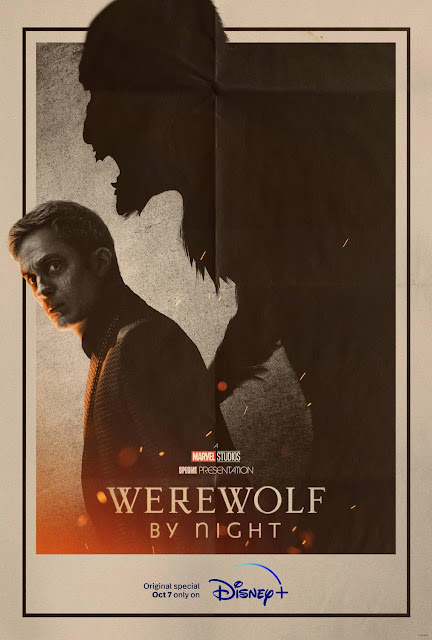Watched: 10/10/2022
Format: Disney+
Viewing: First
Director: (checks notes) Michael Giacchino. Huh.
This fit the dictionary definition of "fine". I'm not mad I watched it, I wasn't against what the story was trying to do, but as pal
JAL rightfully pointed out, the Marvel machinery seems to have taken over for a portion of the film, and I'm not sure it was to the movie's benefit.
Werewolf By Night is no one's favorite thing in comics, and if I'm tracing the lineage correctly, the character (Jack Russell, which surely is someone @#$%ing about) appeared in 1972 at what I'm assuming was part of the 1970's monster explosion as classic horror became hip for kids again. But, also, the Comics Code was no longer nun-teacher strict about rules, and things like "no vampirism, no werewolfism" were stricken from the code.
This thing is a kind of neat experiment by Marvel - making essentially a TV special that works much in the same way we used to get both the famous kids' stuff like Charlie Brown, but also some older-skewing fare. Werewolf By Night is maybe 45 minutes, has a more humble budget than, say, Endgame, and exists as a fun holiday treat. But it's Marvel, so it's also opening the door to the weird and horrific corners of the Marvel U from whence we get Blade the Vampire Hunter (still in development), actual Dracula, but also fellows like Man-Thing.
But as a 45 minute, moderately budgeted film, it's also led by a first time director in Michael Giacchino, who you know as one of the current wave of actually very talented film scorers. Why direct? I have no idea. But I do think, the oddball impact is that you can see what rails Marvel clearly puts around directors as a support system and to ensure certain bits of quality are maintained. But, in this case, I'd say that's where the film gets away from them.
The film has the vibe of someone trying to borrow from Universal horror pictures who doesn't actually know what made up the 1930's and 40's Universal cycle of horror's look and feel. It is definitely in black and white (which some Marvel horror was in the 1970's, natch), but it lacks a certainly visual moodiness and the weight of scenes moored by cameras the weight of an automobile. I am not insisting that anyone shoot everything in American shots for 45 minutes on grainy film, but continuous camera movement is not how Tod Browning and James Whale were shooting movies. It lacks the expressionistic ethos or methods used in both Universal and RKO horror - ie: anyone can turn down color-gradient, not everyone knows what to do next.


.jpg)
.jpg)







